Health Program Evaluation: YWLP and Refugee Women's Health
VerifiedAdded on 2022/09/16
|10
|2708
|26
Report
AI Summary
This report evaluates a health promotion program, the Young Women’s Leadership Program (YWLP), designed to improve health awareness and leadership skills among refugee and migrant women in Monash, Australia. The program's effectiveness is assessed through an analysis of data collection instruments, specifically open-ended questionnaires used in face-to-face, semi-structured interviews based on a phenomenological framework. The report details the five phases of instrument development, including literature review, interview guide formulation, pilot testing, and final presentation. The study aims to determine if community-based training improves health literacy and empowerment. The report discusses the importance of culturally competent healthcare professionals, the role of pilot testing by community-level nurses, and methods for ensuring data rigor, such as participant review of transcripts. The conclusion emphasizes the need for evaluating the effectiveness of such programs, especially given the health inequalities faced by refugee women, and highlights the use of semi-structured interviews to gather participants' lived experiences after the 10-week YWLP session. The report also outlines interview details such as duration, number of participants, and questions.
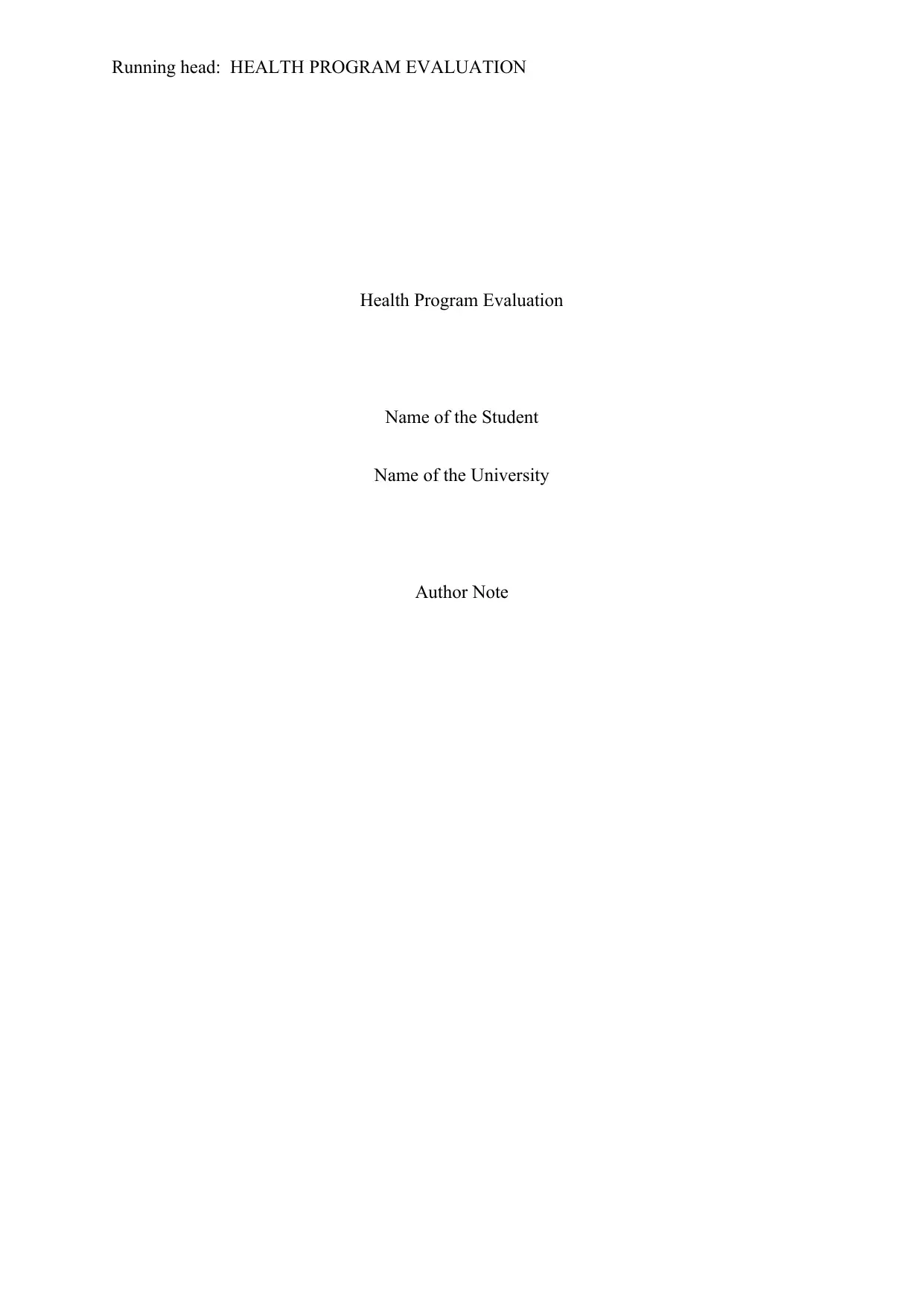
Running head: HEALTH PROGRAM EVALUATION
Health Program Evaluation
Name of the Student
Name of the University
Author Note
Health Program Evaluation
Name of the Student
Name of the University
Author Note
Paraphrase This Document
Need a fresh take? Get an instant paraphrase of this document with our AI Paraphraser
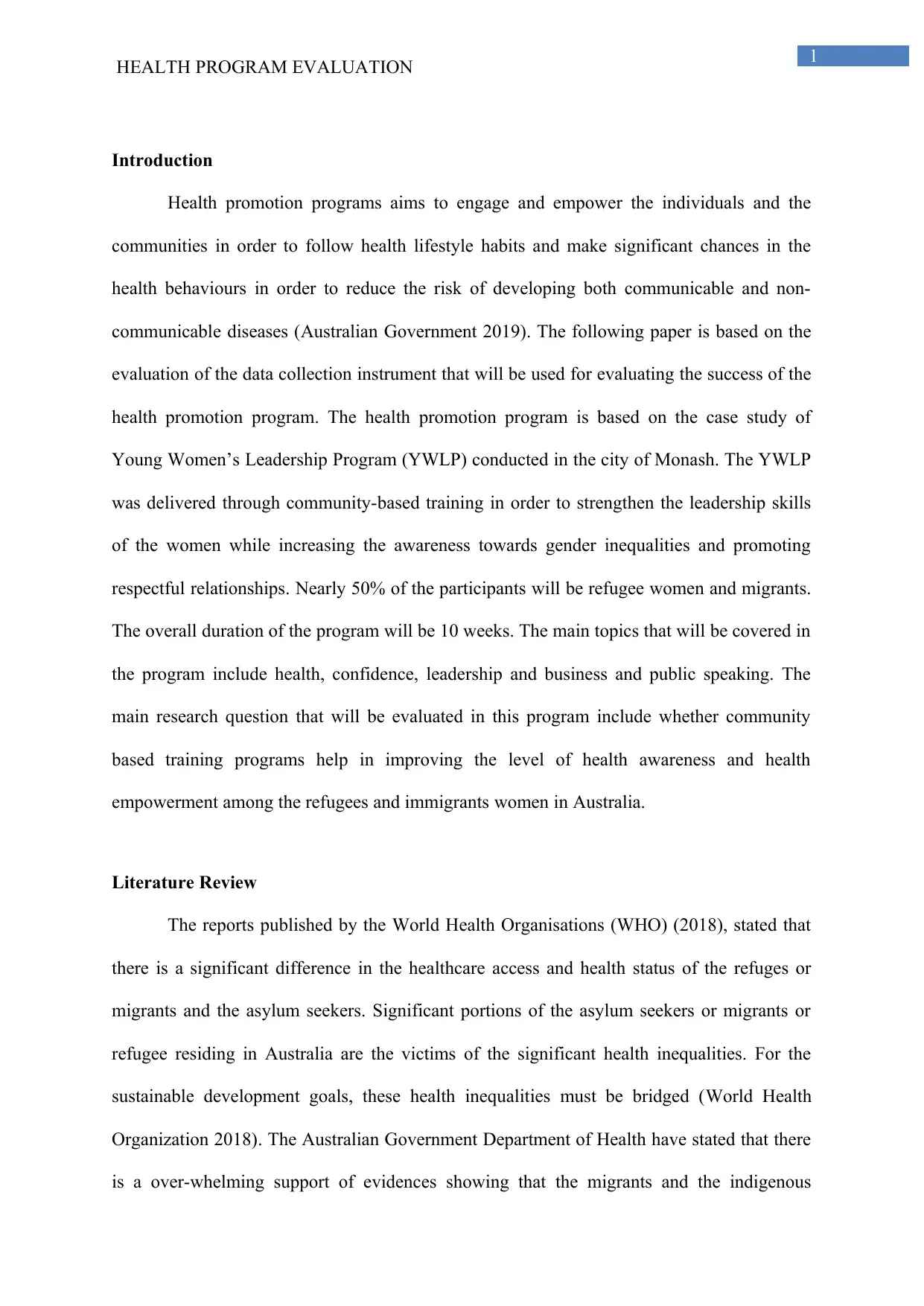
1
HEALTH PROGRAM EVALUATION
Introduction
Health promotion programs aims to engage and empower the individuals and the
communities in order to follow health lifestyle habits and make significant chances in the
health behaviours in order to reduce the risk of developing both communicable and non-
communicable diseases (Australian Government 2019). The following paper is based on the
evaluation of the data collection instrument that will be used for evaluating the success of the
health promotion program. The health promotion program is based on the case study of
Young Women’s Leadership Program (YWLP) conducted in the city of Monash. The YWLP
was delivered through community-based training in order to strengthen the leadership skills
of the women while increasing the awareness towards gender inequalities and promoting
respectful relationships. Nearly 50% of the participants will be refugee women and migrants.
The overall duration of the program will be 10 weeks. The main topics that will be covered in
the program include health, confidence, leadership and business and public speaking. The
main research question that will be evaluated in this program include whether community
based training programs help in improving the level of health awareness and health
empowerment among the refugees and immigrants women in Australia.
Literature Review
The reports published by the World Health Organisations (WHO) (2018), stated that
there is a significant difference in the healthcare access and health status of the refuges or
migrants and the asylum seekers. Significant portions of the asylum seekers or migrants or
refugee residing in Australia are the victims of the significant health inequalities. For the
sustainable development goals, these health inequalities must be bridged (World Health
Organization 2018). The Australian Government Department of Health have stated that there
is a over-whelming support of evidences showing that the migrants and the indigenous
HEALTH PROGRAM EVALUATION
Introduction
Health promotion programs aims to engage and empower the individuals and the
communities in order to follow health lifestyle habits and make significant chances in the
health behaviours in order to reduce the risk of developing both communicable and non-
communicable diseases (Australian Government 2019). The following paper is based on the
evaluation of the data collection instrument that will be used for evaluating the success of the
health promotion program. The health promotion program is based on the case study of
Young Women’s Leadership Program (YWLP) conducted in the city of Monash. The YWLP
was delivered through community-based training in order to strengthen the leadership skills
of the women while increasing the awareness towards gender inequalities and promoting
respectful relationships. Nearly 50% of the participants will be refugee women and migrants.
The overall duration of the program will be 10 weeks. The main topics that will be covered in
the program include health, confidence, leadership and business and public speaking. The
main research question that will be evaluated in this program include whether community
based training programs help in improving the level of health awareness and health
empowerment among the refugees and immigrants women in Australia.
Literature Review
The reports published by the World Health Organisations (WHO) (2018), stated that
there is a significant difference in the healthcare access and health status of the refuges or
migrants and the asylum seekers. Significant portions of the asylum seekers or migrants or
refugee residing in Australia are the victims of the significant health inequalities. For the
sustainable development goals, these health inequalities must be bridged (World Health
Organization 2018). The Australian Government Department of Health have stated that there
is a over-whelming support of evidences showing that the migrants and the indigenous
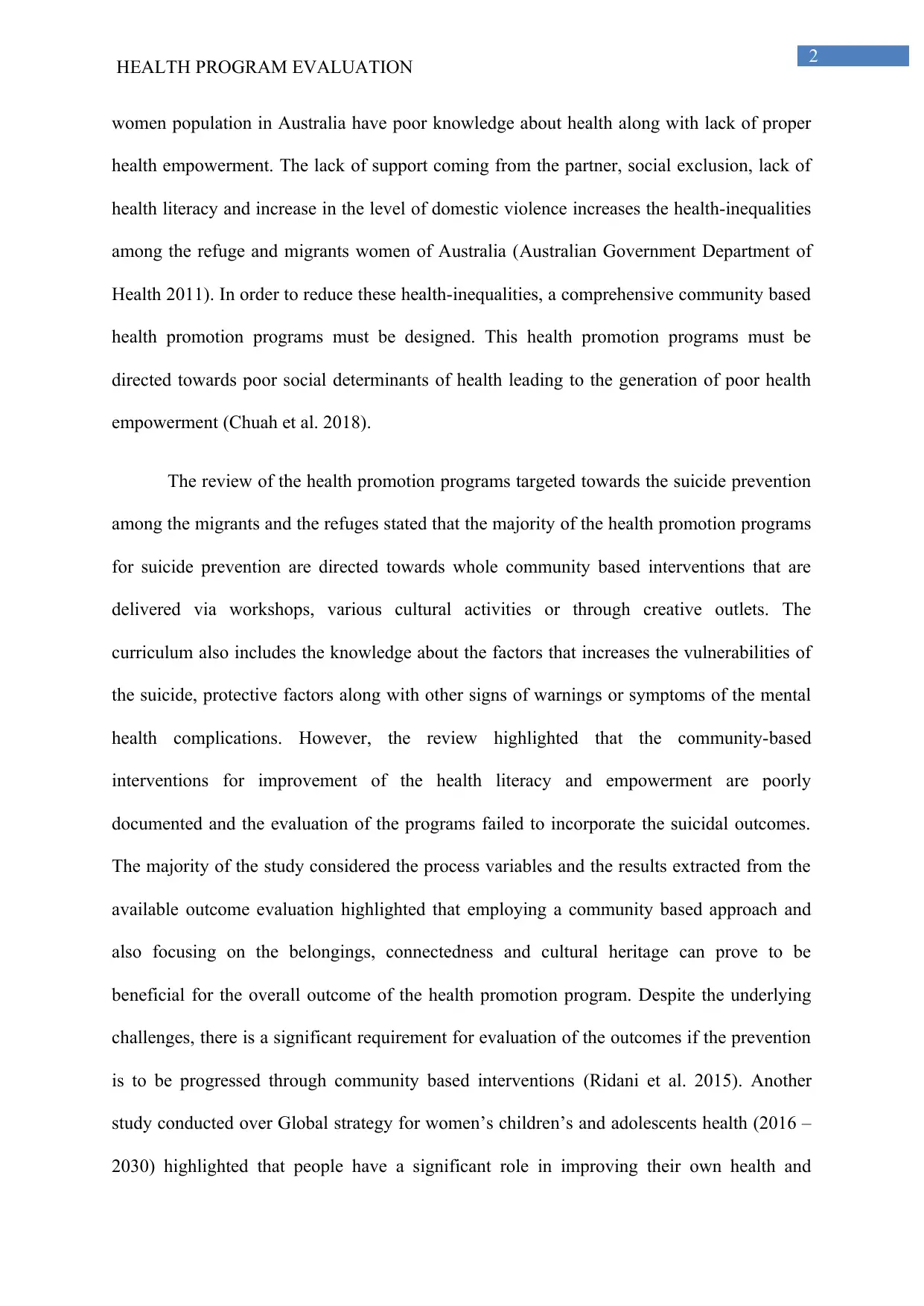
2
HEALTH PROGRAM EVALUATION
women population in Australia have poor knowledge about health along with lack of proper
health empowerment. The lack of support coming from the partner, social exclusion, lack of
health literacy and increase in the level of domestic violence increases the health-inequalities
among the refuge and migrants women of Australia (Australian Government Department of
Health 2011). In order to reduce these health-inequalities, a comprehensive community based
health promotion programs must be designed. This health promotion programs must be
directed towards poor social determinants of health leading to the generation of poor health
empowerment (Chuah et al. 2018).
The review of the health promotion programs targeted towards the suicide prevention
among the migrants and the refuges stated that the majority of the health promotion programs
for suicide prevention are directed towards whole community based interventions that are
delivered via workshops, various cultural activities or through creative outlets. The
curriculum also includes the knowledge about the factors that increases the vulnerabilities of
the suicide, protective factors along with other signs of warnings or symptoms of the mental
health complications. However, the review highlighted that the community-based
interventions for improvement of the health literacy and empowerment are poorly
documented and the evaluation of the programs failed to incorporate the suicidal outcomes.
The majority of the study considered the process variables and the results extracted from the
available outcome evaluation highlighted that employing a community based approach and
also focusing on the belongings, connectedness and cultural heritage can prove to be
beneficial for the overall outcome of the health promotion program. Despite the underlying
challenges, there is a significant requirement for evaluation of the outcomes if the prevention
is to be progressed through community based interventions (Ridani et al. 2015). Another
study conducted over Global strategy for women’s children’s and adolescents health (2016 –
2030) highlighted that people have a significant role in improving their own health and
HEALTH PROGRAM EVALUATION
women population in Australia have poor knowledge about health along with lack of proper
health empowerment. The lack of support coming from the partner, social exclusion, lack of
health literacy and increase in the level of domestic violence increases the health-inequalities
among the refuge and migrants women of Australia (Australian Government Department of
Health 2011). In order to reduce these health-inequalities, a comprehensive community based
health promotion programs must be designed. This health promotion programs must be
directed towards poor social determinants of health leading to the generation of poor health
empowerment (Chuah et al. 2018).
The review of the health promotion programs targeted towards the suicide prevention
among the migrants and the refuges stated that the majority of the health promotion programs
for suicide prevention are directed towards whole community based interventions that are
delivered via workshops, various cultural activities or through creative outlets. The
curriculum also includes the knowledge about the factors that increases the vulnerabilities of
the suicide, protective factors along with other signs of warnings or symptoms of the mental
health complications. However, the review highlighted that the community-based
interventions for improvement of the health literacy and empowerment are poorly
documented and the evaluation of the programs failed to incorporate the suicidal outcomes.
The majority of the study considered the process variables and the results extracted from the
available outcome evaluation highlighted that employing a community based approach and
also focusing on the belongings, connectedness and cultural heritage can prove to be
beneficial for the overall outcome of the health promotion program. Despite the underlying
challenges, there is a significant requirement for evaluation of the outcomes if the prevention
is to be progressed through community based interventions (Ridani et al. 2015). Another
study conducted over Global strategy for women’s children’s and adolescents health (2016 –
2030) highlighted that people have a significant role in improving their own health and
⊘ This is a preview!⊘
Do you want full access?
Subscribe today to unlock all pages.

Trusted by 1+ million students worldwide
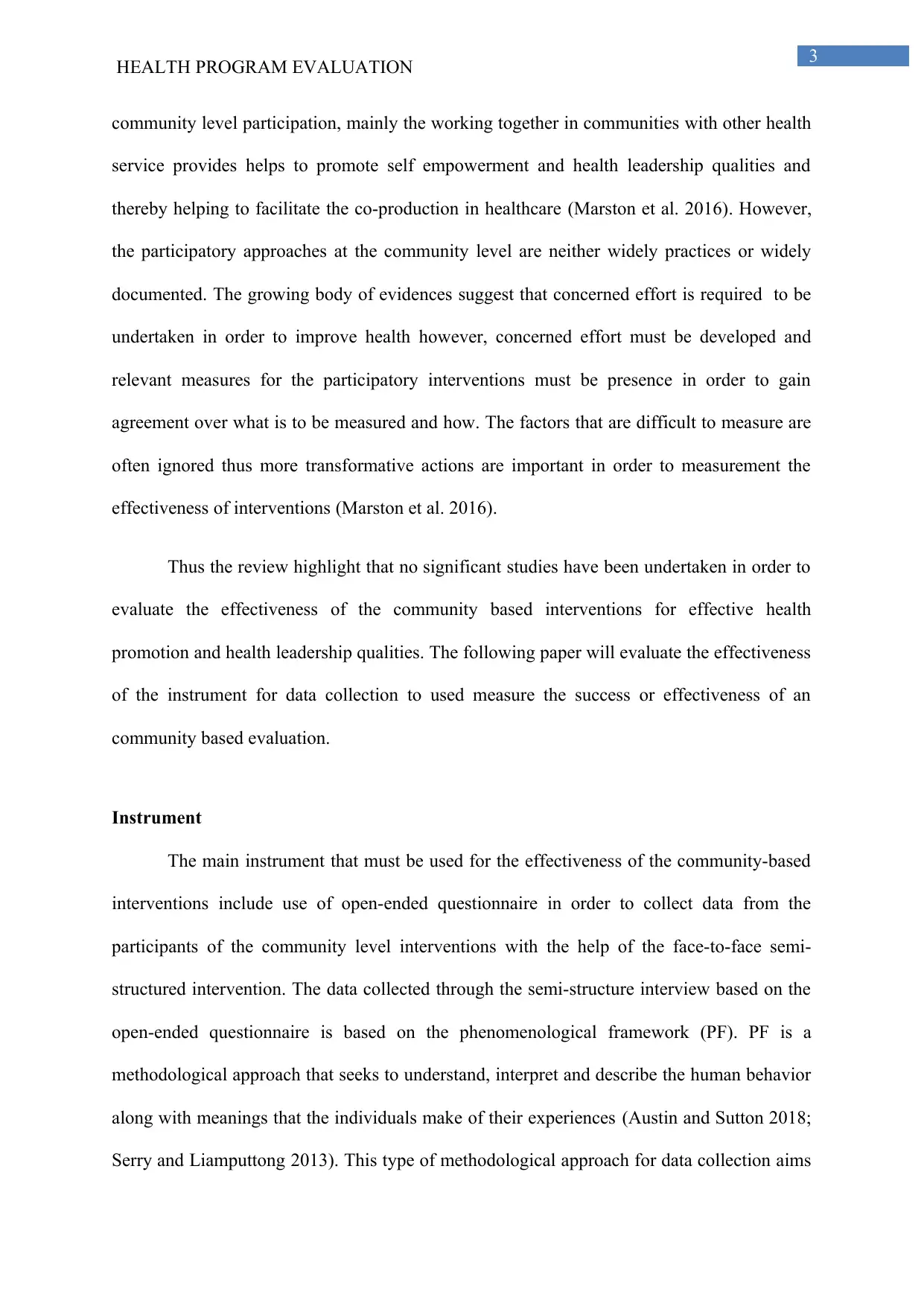
3
HEALTH PROGRAM EVALUATION
community level participation, mainly the working together in communities with other health
service provides helps to promote self empowerment and health leadership qualities and
thereby helping to facilitate the co-production in healthcare (Marston et al. 2016). However,
the participatory approaches at the community level are neither widely practices or widely
documented. The growing body of evidences suggest that concerned effort is required to be
undertaken in order to improve health however, concerned effort must be developed and
relevant measures for the participatory interventions must be presence in order to gain
agreement over what is to be measured and how. The factors that are difficult to measure are
often ignored thus more transformative actions are important in order to measurement the
effectiveness of interventions (Marston et al. 2016).
Thus the review highlight that no significant studies have been undertaken in order to
evaluate the effectiveness of the community based interventions for effective health
promotion and health leadership qualities. The following paper will evaluate the effectiveness
of the instrument for data collection to used measure the success or effectiveness of an
community based evaluation.
Instrument
The main instrument that must be used for the effectiveness of the community-based
interventions include use of open-ended questionnaire in order to collect data from the
participants of the community level interventions with the help of the face-to-face semi-
structured intervention. The data collected through the semi-structure interview based on the
open-ended questionnaire is based on the phenomenological framework (PF). PF is a
methodological approach that seeks to understand, interpret and describe the human behavior
along with meanings that the individuals make of their experiences (Austin and Sutton 2018;
Serry and Liamputtong 2013). This type of methodological approach for data collection aims
HEALTH PROGRAM EVALUATION
community level participation, mainly the working together in communities with other health
service provides helps to promote self empowerment and health leadership qualities and
thereby helping to facilitate the co-production in healthcare (Marston et al. 2016). However,
the participatory approaches at the community level are neither widely practices or widely
documented. The growing body of evidences suggest that concerned effort is required to be
undertaken in order to improve health however, concerned effort must be developed and
relevant measures for the participatory interventions must be presence in order to gain
agreement over what is to be measured and how. The factors that are difficult to measure are
often ignored thus more transformative actions are important in order to measurement the
effectiveness of interventions (Marston et al. 2016).
Thus the review highlight that no significant studies have been undertaken in order to
evaluate the effectiveness of the community based interventions for effective health
promotion and health leadership qualities. The following paper will evaluate the effectiveness
of the instrument for data collection to used measure the success or effectiveness of an
community based evaluation.
Instrument
The main instrument that must be used for the effectiveness of the community-based
interventions include use of open-ended questionnaire in order to collect data from the
participants of the community level interventions with the help of the face-to-face semi-
structured intervention. The data collected through the semi-structure interview based on the
open-ended questionnaire is based on the phenomenological framework (PF). PF is a
methodological approach that seeks to understand, interpret and describe the human behavior
along with meanings that the individuals make of their experiences (Austin and Sutton 2018;
Serry and Liamputtong 2013). This type of methodological approach for data collection aims
Paraphrase This Document
Need a fresh take? Get an instant paraphrase of this document with our AI Paraphraser
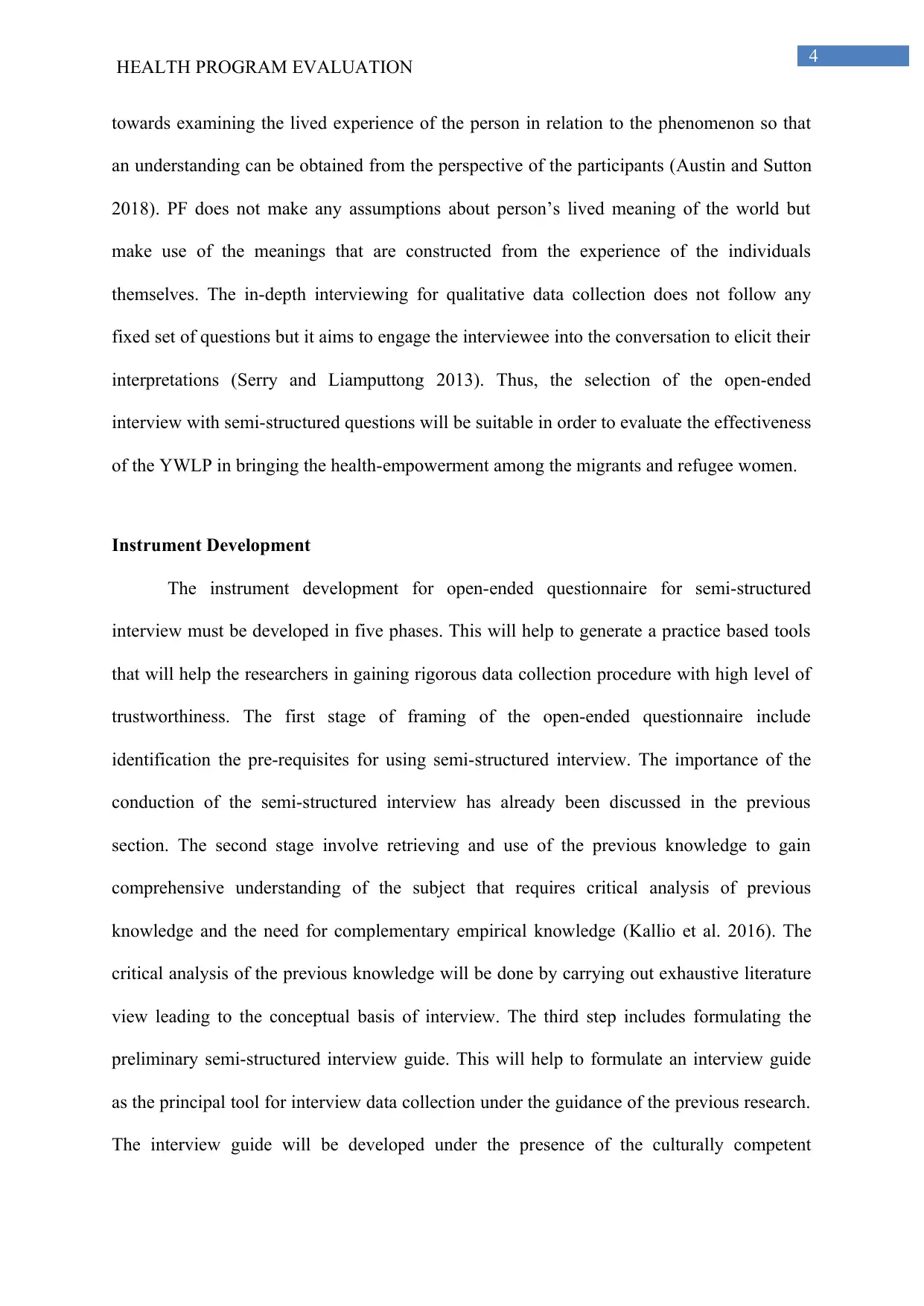
4
HEALTH PROGRAM EVALUATION
towards examining the lived experience of the person in relation to the phenomenon so that
an understanding can be obtained from the perspective of the participants (Austin and Sutton
2018). PF does not make any assumptions about person’s lived meaning of the world but
make use of the meanings that are constructed from the experience of the individuals
themselves. The in-depth interviewing for qualitative data collection does not follow any
fixed set of questions but it aims to engage the interviewee into the conversation to elicit their
interpretations (Serry and Liamputtong 2013). Thus, the selection of the open-ended
interview with semi-structured questions will be suitable in order to evaluate the effectiveness
of the YWLP in bringing the health-empowerment among the migrants and refugee women.
Instrument Development
The instrument development for open-ended questionnaire for semi-structured
interview must be developed in five phases. This will help to generate a practice based tools
that will help the researchers in gaining rigorous data collection procedure with high level of
trustworthiness. The first stage of framing of the open-ended questionnaire include
identification the pre-requisites for using semi-structured interview. The importance of the
conduction of the semi-structured interview has already been discussed in the previous
section. The second stage involve retrieving and use of the previous knowledge to gain
comprehensive understanding of the subject that requires critical analysis of previous
knowledge and the need for complementary empirical knowledge (Kallio et al. 2016). The
critical analysis of the previous knowledge will be done by carrying out exhaustive literature
view leading to the conceptual basis of interview. The third step includes formulating the
preliminary semi-structured interview guide. This will help to formulate an interview guide
as the principal tool for interview data collection under the guidance of the previous research.
The interview guide will be developed under the presence of the culturally competent
HEALTH PROGRAM EVALUATION
towards examining the lived experience of the person in relation to the phenomenon so that
an understanding can be obtained from the perspective of the participants (Austin and Sutton
2018). PF does not make any assumptions about person’s lived meaning of the world but
make use of the meanings that are constructed from the experience of the individuals
themselves. The in-depth interviewing for qualitative data collection does not follow any
fixed set of questions but it aims to engage the interviewee into the conversation to elicit their
interpretations (Serry and Liamputtong 2013). Thus, the selection of the open-ended
interview with semi-structured questions will be suitable in order to evaluate the effectiveness
of the YWLP in bringing the health-empowerment among the migrants and refugee women.
Instrument Development
The instrument development for open-ended questionnaire for semi-structured
interview must be developed in five phases. This will help to generate a practice based tools
that will help the researchers in gaining rigorous data collection procedure with high level of
trustworthiness. The first stage of framing of the open-ended questionnaire include
identification the pre-requisites for using semi-structured interview. The importance of the
conduction of the semi-structured interview has already been discussed in the previous
section. The second stage involve retrieving and use of the previous knowledge to gain
comprehensive understanding of the subject that requires critical analysis of previous
knowledge and the need for complementary empirical knowledge (Kallio et al. 2016). The
critical analysis of the previous knowledge will be done by carrying out exhaustive literature
view leading to the conceptual basis of interview. The third step includes formulating the
preliminary semi-structured interview guide. This will help to formulate an interview guide
as the principal tool for interview data collection under the guidance of the previous research.
The interview guide will be developed under the presence of the culturally competent
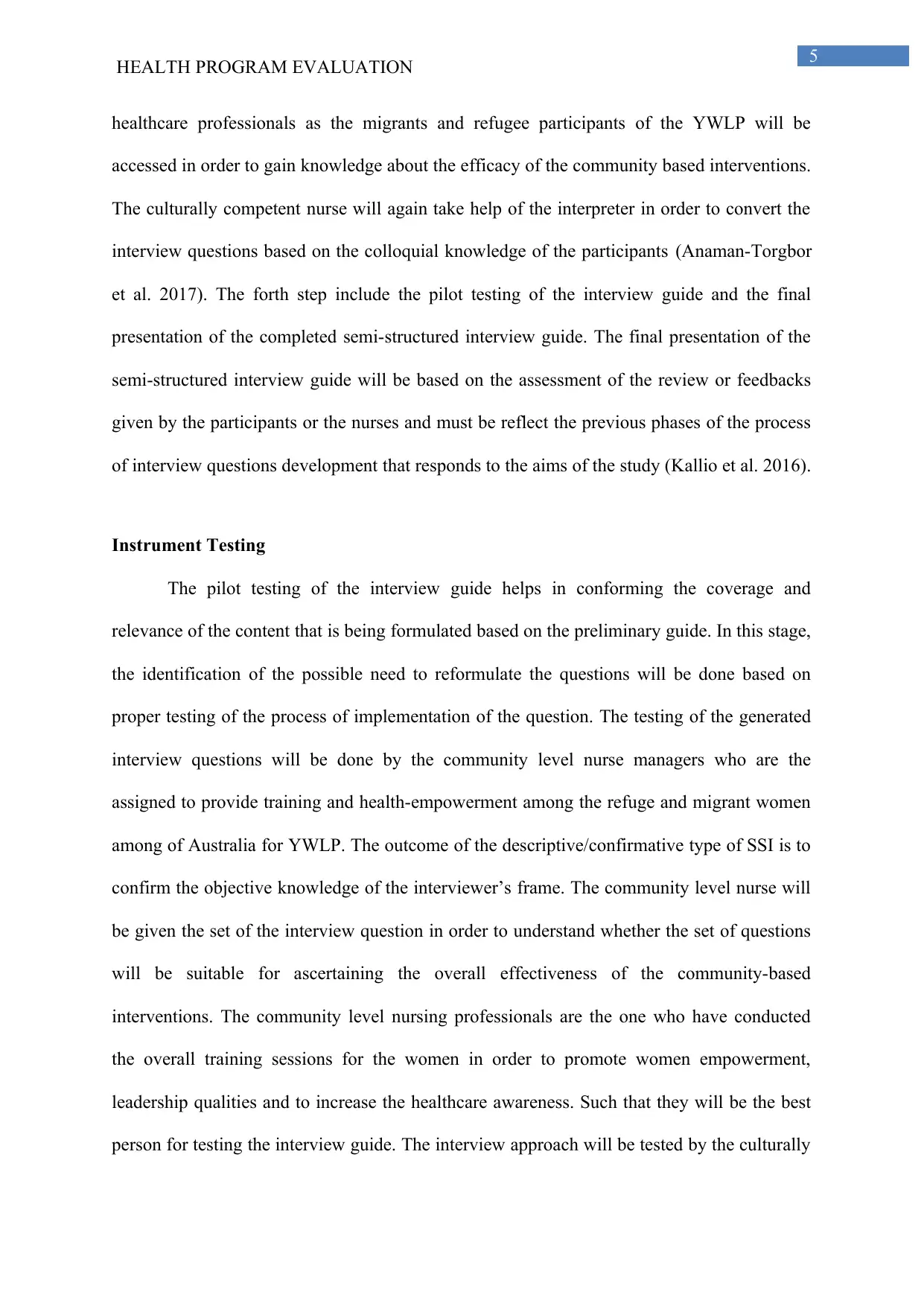
5
HEALTH PROGRAM EVALUATION
healthcare professionals as the migrants and refugee participants of the YWLP will be
accessed in order to gain knowledge about the efficacy of the community based interventions.
The culturally competent nurse will again take help of the interpreter in order to convert the
interview questions based on the colloquial knowledge of the participants (Anaman-Torgbor
et al. 2017). The forth step include the pilot testing of the interview guide and the final
presentation of the completed semi-structured interview guide. The final presentation of the
semi-structured interview guide will be based on the assessment of the review or feedbacks
given by the participants or the nurses and must be reflect the previous phases of the process
of interview questions development that responds to the aims of the study (Kallio et al. 2016).
Instrument Testing
The pilot testing of the interview guide helps in conforming the coverage and
relevance of the content that is being formulated based on the preliminary guide. In this stage,
the identification of the possible need to reformulate the questions will be done based on
proper testing of the process of implementation of the question. The testing of the generated
interview questions will be done by the community level nurse managers who are the
assigned to provide training and health-empowerment among the refuge and migrant women
among of Australia for YWLP. The outcome of the descriptive/confirmative type of SSI is to
confirm the objective knowledge of the interviewer’s frame. The community level nurse will
be given the set of the interview question in order to understand whether the set of questions
will be suitable for ascertaining the overall effectiveness of the community-based
interventions. The community level nursing professionals are the one who have conducted
the overall training sessions for the women in order to promote women empowerment,
leadership qualities and to increase the healthcare awareness. Such that they will be the best
person for testing the interview guide. The interview approach will be tested by the culturally
HEALTH PROGRAM EVALUATION
healthcare professionals as the migrants and refugee participants of the YWLP will be
accessed in order to gain knowledge about the efficacy of the community based interventions.
The culturally competent nurse will again take help of the interpreter in order to convert the
interview questions based on the colloquial knowledge of the participants (Anaman-Torgbor
et al. 2017). The forth step include the pilot testing of the interview guide and the final
presentation of the completed semi-structured interview guide. The final presentation of the
semi-structured interview guide will be based on the assessment of the review or feedbacks
given by the participants or the nurses and must be reflect the previous phases of the process
of interview questions development that responds to the aims of the study (Kallio et al. 2016).
Instrument Testing
The pilot testing of the interview guide helps in conforming the coverage and
relevance of the content that is being formulated based on the preliminary guide. In this stage,
the identification of the possible need to reformulate the questions will be done based on
proper testing of the process of implementation of the question. The testing of the generated
interview questions will be done by the community level nurse managers who are the
assigned to provide training and health-empowerment among the refuge and migrant women
among of Australia for YWLP. The outcome of the descriptive/confirmative type of SSI is to
confirm the objective knowledge of the interviewer’s frame. The community level nurse will
be given the set of the interview question in order to understand whether the set of questions
will be suitable for ascertaining the overall effectiveness of the community-based
interventions. The community level nursing professionals are the one who have conducted
the overall training sessions for the women in order to promote women empowerment,
leadership qualities and to increase the healthcare awareness. Such that they will be the best
person for testing the interview guide. The interview approach will be tested by the culturally
⊘ This is a preview!⊘
Do you want full access?
Subscribe today to unlock all pages.

Trusted by 1+ million students worldwide
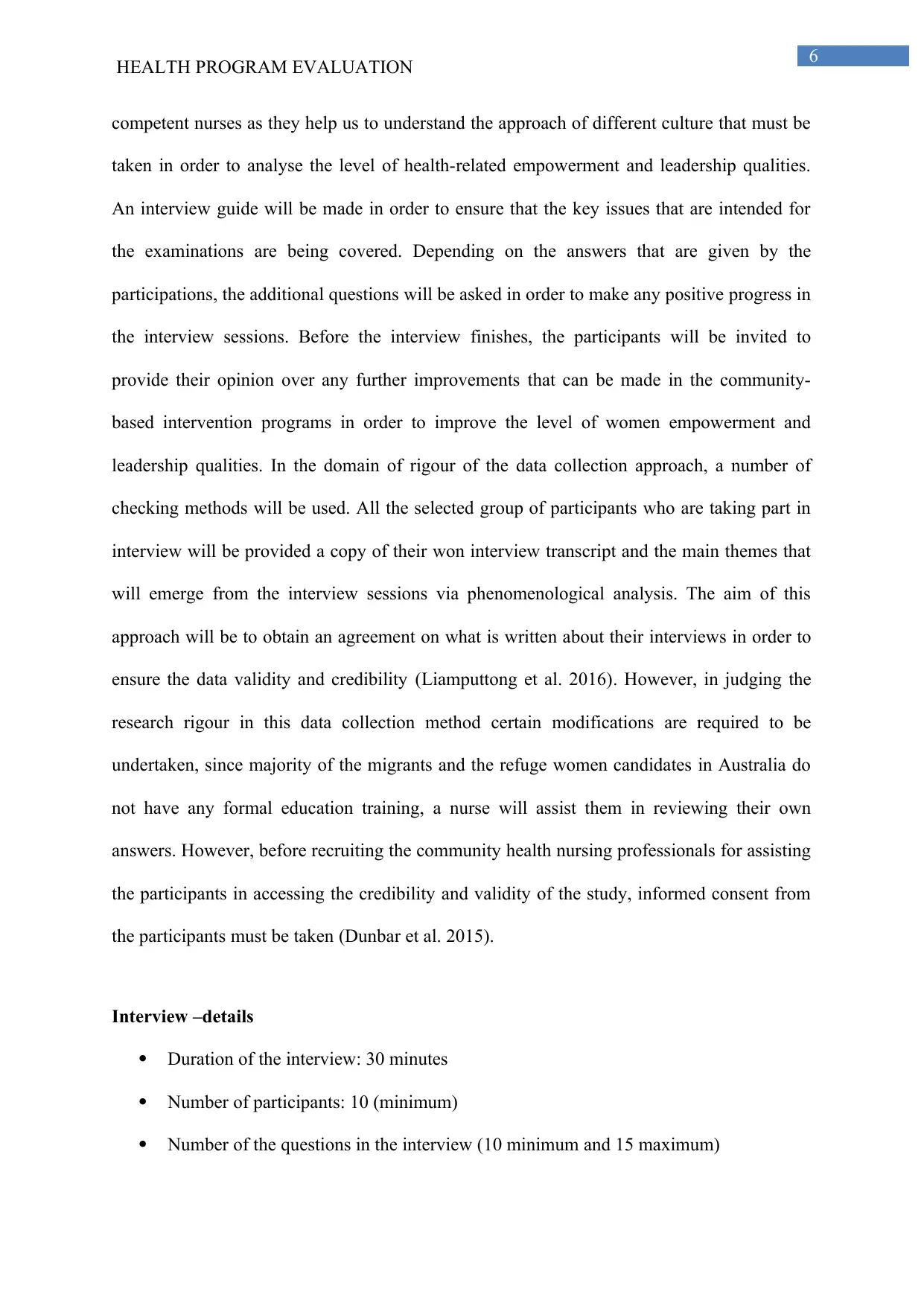
6
HEALTH PROGRAM EVALUATION
competent nurses as they help us to understand the approach of different culture that must be
taken in order to analyse the level of health-related empowerment and leadership qualities.
An interview guide will be made in order to ensure that the key issues that are intended for
the examinations are being covered. Depending on the answers that are given by the
participations, the additional questions will be asked in order to make any positive progress in
the interview sessions. Before the interview finishes, the participants will be invited to
provide their opinion over any further improvements that can be made in the community-
based intervention programs in order to improve the level of women empowerment and
leadership qualities. In the domain of rigour of the data collection approach, a number of
checking methods will be used. All the selected group of participants who are taking part in
interview will be provided a copy of their won interview transcript and the main themes that
will emerge from the interview sessions via phenomenological analysis. The aim of this
approach will be to obtain an agreement on what is written about their interviews in order to
ensure the data validity and credibility (Liamputtong et al. 2016). However, in judging the
research rigour in this data collection method certain modifications are required to be
undertaken, since majority of the migrants and the refuge women candidates in Australia do
not have any formal education training, a nurse will assist them in reviewing their own
answers. However, before recruiting the community health nursing professionals for assisting
the participants in accessing the credibility and validity of the study, informed consent from
the participants must be taken (Dunbar et al. 2015).
Interview –details
Duration of the interview: 30 minutes
Number of participants: 10 (minimum)
Number of the questions in the interview (10 minimum and 15 maximum)
HEALTH PROGRAM EVALUATION
competent nurses as they help us to understand the approach of different culture that must be
taken in order to analyse the level of health-related empowerment and leadership qualities.
An interview guide will be made in order to ensure that the key issues that are intended for
the examinations are being covered. Depending on the answers that are given by the
participations, the additional questions will be asked in order to make any positive progress in
the interview sessions. Before the interview finishes, the participants will be invited to
provide their opinion over any further improvements that can be made in the community-
based intervention programs in order to improve the level of women empowerment and
leadership qualities. In the domain of rigour of the data collection approach, a number of
checking methods will be used. All the selected group of participants who are taking part in
interview will be provided a copy of their won interview transcript and the main themes that
will emerge from the interview sessions via phenomenological analysis. The aim of this
approach will be to obtain an agreement on what is written about their interviews in order to
ensure the data validity and credibility (Liamputtong et al. 2016). However, in judging the
research rigour in this data collection method certain modifications are required to be
undertaken, since majority of the migrants and the refuge women candidates in Australia do
not have any formal education training, a nurse will assist them in reviewing their own
answers. However, before recruiting the community health nursing professionals for assisting
the participants in accessing the credibility and validity of the study, informed consent from
the participants must be taken (Dunbar et al. 2015).
Interview –details
Duration of the interview: 30 minutes
Number of participants: 10 (minimum)
Number of the questions in the interview (10 minimum and 15 maximum)
Paraphrase This Document
Need a fresh take? Get an instant paraphrase of this document with our AI Paraphraser
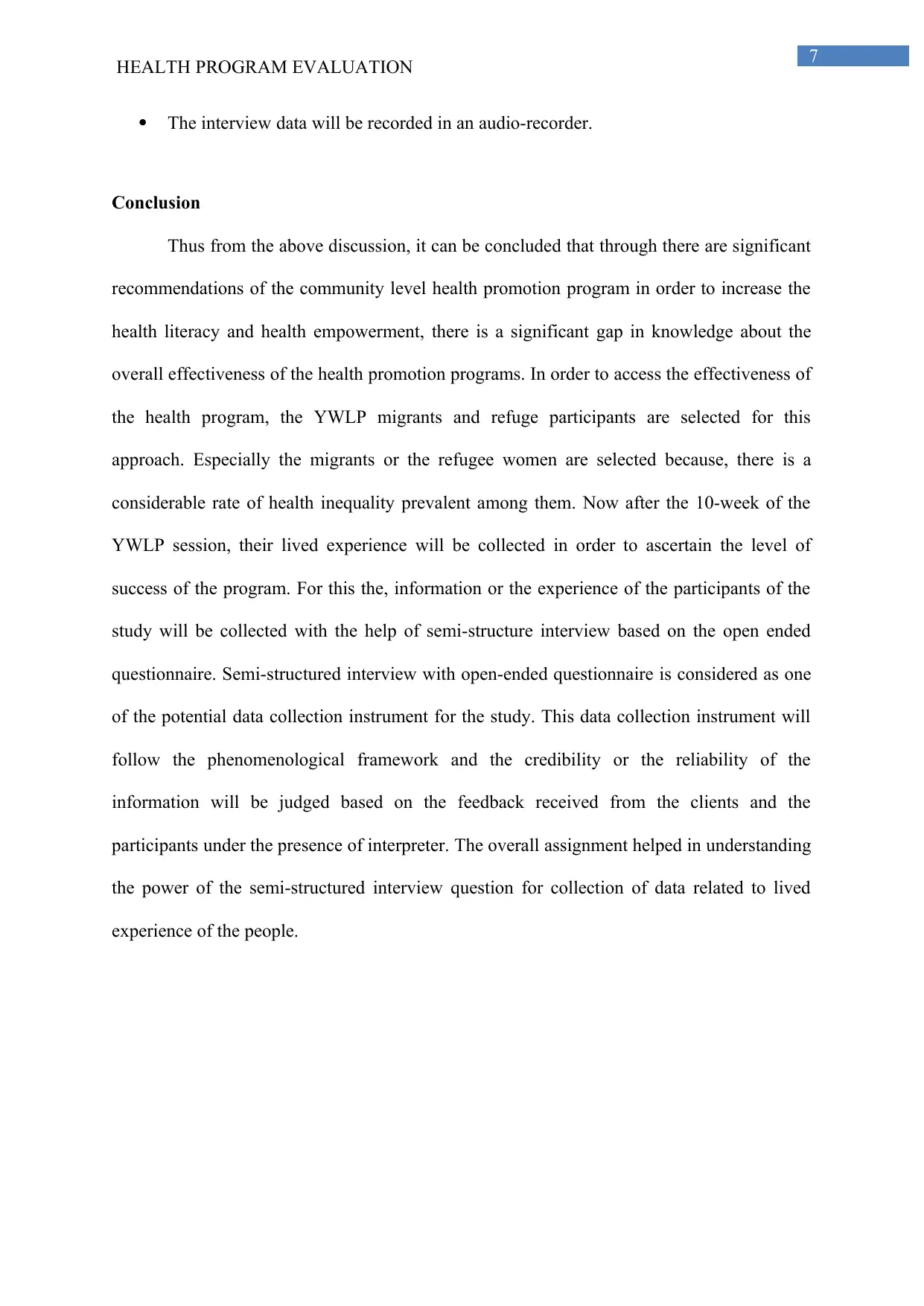
7
HEALTH PROGRAM EVALUATION
The interview data will be recorded in an audio-recorder.
Conclusion
Thus from the above discussion, it can be concluded that through there are significant
recommendations of the community level health promotion program in order to increase the
health literacy and health empowerment, there is a significant gap in knowledge about the
overall effectiveness of the health promotion programs. In order to access the effectiveness of
the health program, the YWLP migrants and refuge participants are selected for this
approach. Especially the migrants or the refugee women are selected because, there is a
considerable rate of health inequality prevalent among them. Now after the 10-week of the
YWLP session, their lived experience will be collected in order to ascertain the level of
success of the program. For this the, information or the experience of the participants of the
study will be collected with the help of semi-structure interview based on the open ended
questionnaire. Semi-structured interview with open-ended questionnaire is considered as one
of the potential data collection instrument for the study. This data collection instrument will
follow the phenomenological framework and the credibility or the reliability of the
information will be judged based on the feedback received from the clients and the
participants under the presence of interpreter. The overall assignment helped in understanding
the power of the semi-structured interview question for collection of data related to lived
experience of the people.
HEALTH PROGRAM EVALUATION
The interview data will be recorded in an audio-recorder.
Conclusion
Thus from the above discussion, it can be concluded that through there are significant
recommendations of the community level health promotion program in order to increase the
health literacy and health empowerment, there is a significant gap in knowledge about the
overall effectiveness of the health promotion programs. In order to access the effectiveness of
the health program, the YWLP migrants and refuge participants are selected for this
approach. Especially the migrants or the refugee women are selected because, there is a
considerable rate of health inequality prevalent among them. Now after the 10-week of the
YWLP session, their lived experience will be collected in order to ascertain the level of
success of the program. For this the, information or the experience of the participants of the
study will be collected with the help of semi-structure interview based on the open ended
questionnaire. Semi-structured interview with open-ended questionnaire is considered as one
of the potential data collection instrument for the study. This data collection instrument will
follow the phenomenological framework and the credibility or the reliability of the
information will be judged based on the feedback received from the clients and the
participants under the presence of interpreter. The overall assignment helped in understanding
the power of the semi-structured interview question for collection of data related to lived
experience of the people.
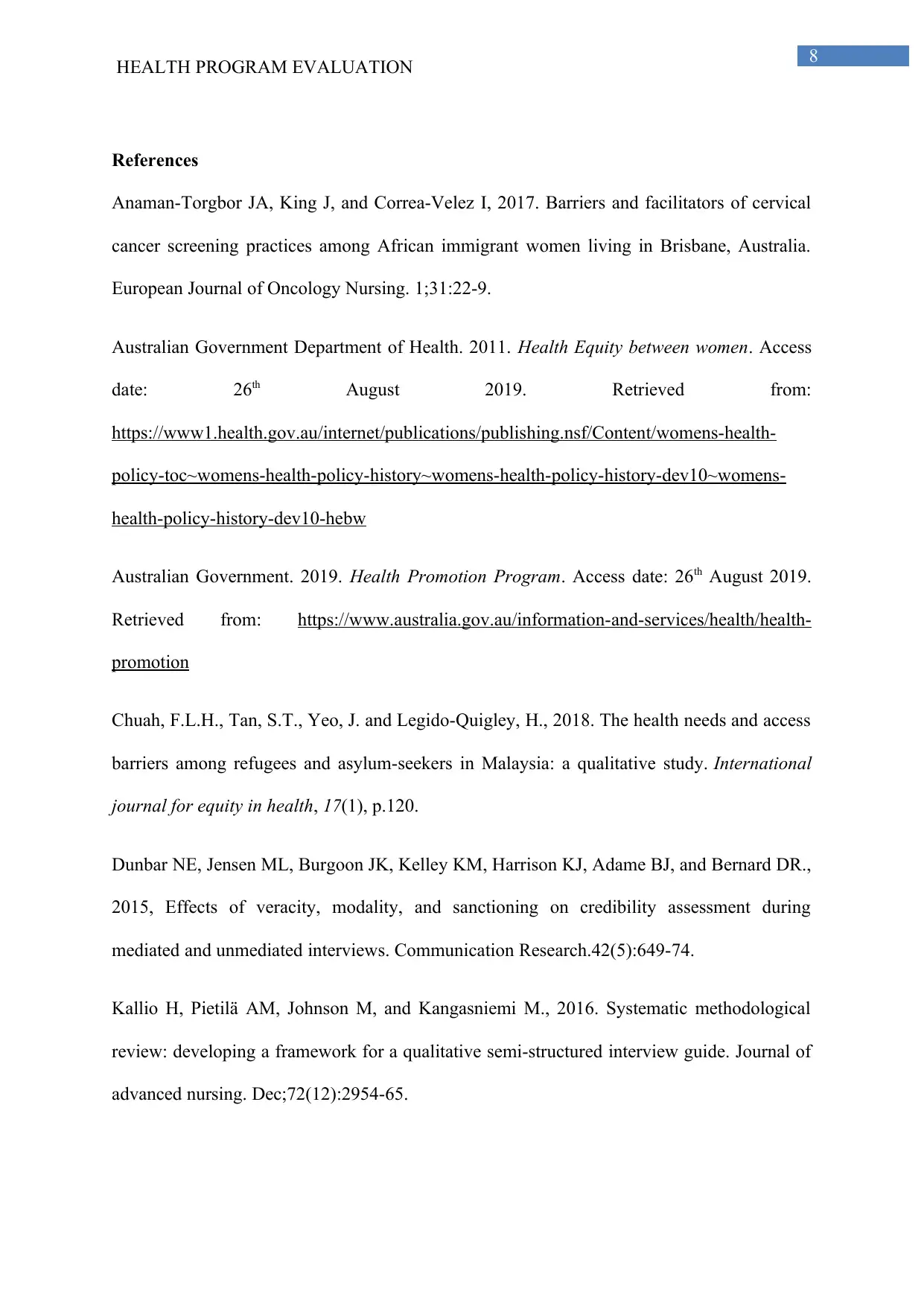
8
HEALTH PROGRAM EVALUATION
References
Anaman-Torgbor JA, King J, and Correa-Velez I, 2017. Barriers and facilitators of cervical
cancer screening practices among African immigrant women living in Brisbane, Australia.
European Journal of Oncology Nursing. 1;31:22-9.
Australian Government Department of Health. 2011. Health Equity between women. Access
date: 26th August 2019. Retrieved from:
https://www1.health.gov.au/internet/publications/publishing.nsf/Content/womens-health-
policy-toc~womens-health-policy-history~womens-health-policy-history-dev10~womens-
health-policy-history-dev10-hebw
Australian Government. 2019. Health Promotion Program. Access date: 26th August 2019.
Retrieved from: https://www.australia.gov.au/information-and-services/health/health-
promotion
Chuah, F.L.H., Tan, S.T., Yeo, J. and Legido-Quigley, H., 2018. The health needs and access
barriers among refugees and asylum-seekers in Malaysia: a qualitative study. International
journal for equity in health, 17(1), p.120.
Dunbar NE, Jensen ML, Burgoon JK, Kelley KM, Harrison KJ, Adame BJ, and Bernard DR.,
2015, Effects of veracity, modality, and sanctioning on credibility assessment during
mediated and unmediated interviews. Communication Research.42(5):649-74.
Kallio H, Pietilä AM, Johnson M, and Kangasniemi M., 2016. Systematic methodological
review: developing a framework for a qualitative semi‐structured interview guide. Journal of
advanced nursing. Dec;72(12):2954-65.
HEALTH PROGRAM EVALUATION
References
Anaman-Torgbor JA, King J, and Correa-Velez I, 2017. Barriers and facilitators of cervical
cancer screening practices among African immigrant women living in Brisbane, Australia.
European Journal of Oncology Nursing. 1;31:22-9.
Australian Government Department of Health. 2011. Health Equity between women. Access
date: 26th August 2019. Retrieved from:
https://www1.health.gov.au/internet/publications/publishing.nsf/Content/womens-health-
policy-toc~womens-health-policy-history~womens-health-policy-history-dev10~womens-
health-policy-history-dev10-hebw
Australian Government. 2019. Health Promotion Program. Access date: 26th August 2019.
Retrieved from: https://www.australia.gov.au/information-and-services/health/health-
promotion
Chuah, F.L.H., Tan, S.T., Yeo, J. and Legido-Quigley, H., 2018. The health needs and access
barriers among refugees and asylum-seekers in Malaysia: a qualitative study. International
journal for equity in health, 17(1), p.120.
Dunbar NE, Jensen ML, Burgoon JK, Kelley KM, Harrison KJ, Adame BJ, and Bernard DR.,
2015, Effects of veracity, modality, and sanctioning on credibility assessment during
mediated and unmediated interviews. Communication Research.42(5):649-74.
Kallio H, Pietilä AM, Johnson M, and Kangasniemi M., 2016. Systematic methodological
review: developing a framework for a qualitative semi‐structured interview guide. Journal of
advanced nursing. Dec;72(12):2954-65.
⊘ This is a preview!⊘
Do you want full access?
Subscribe today to unlock all pages.

Trusted by 1+ million students worldwide
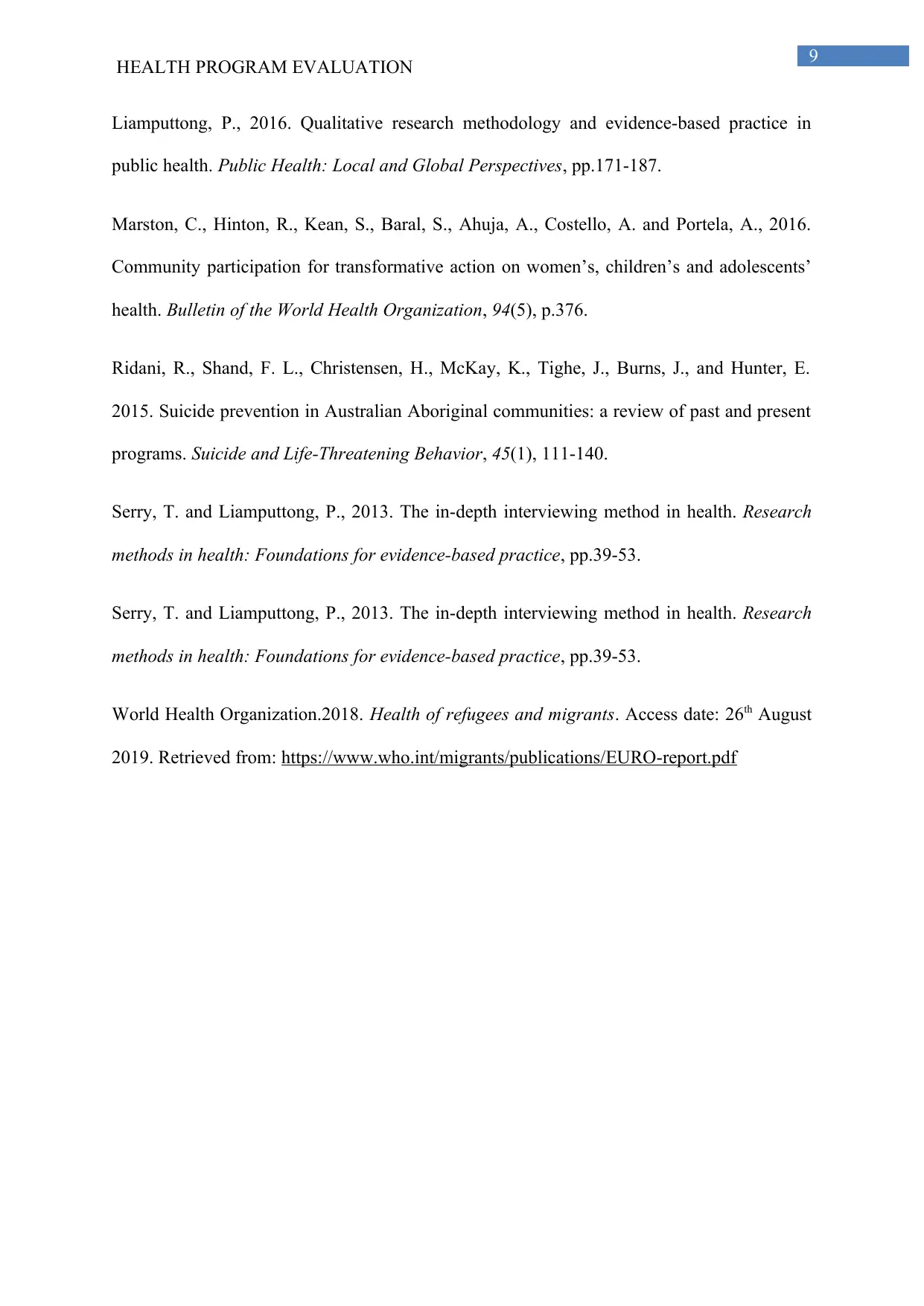
9
HEALTH PROGRAM EVALUATION
Liamputtong, P., 2016. Qualitative research methodology and evidence-based practice in
public health. Public Health: Local and Global Perspectives, pp.171-187.
Marston, C., Hinton, R., Kean, S., Baral, S., Ahuja, A., Costello, A. and Portela, A., 2016.
Community participation for transformative action on women’s, children’s and adolescents’
health. Bulletin of the World Health Organization, 94(5), p.376.
Ridani, R., Shand, F. L., Christensen, H., McKay, K., Tighe, J., Burns, J., and Hunter, E.
2015. Suicide prevention in Australian Aboriginal communities: a review of past and present
programs. Suicide and Life‐Threatening Behavior, 45(1), 111-140.
Serry, T. and Liamputtong, P., 2013. The in-depth interviewing method in health. Research
methods in health: Foundations for evidence-based practice, pp.39-53.
Serry, T. and Liamputtong, P., 2013. The in-depth interviewing method in health. Research
methods in health: Foundations for evidence-based practice, pp.39-53.
World Health Organization.2018. Health of refugees and migrants. Access date: 26th August
2019. Retrieved from: https://www.who.int/migrants/publications/EURO-report.pdf
HEALTH PROGRAM EVALUATION
Liamputtong, P., 2016. Qualitative research methodology and evidence-based practice in
public health. Public Health: Local and Global Perspectives, pp.171-187.
Marston, C., Hinton, R., Kean, S., Baral, S., Ahuja, A., Costello, A. and Portela, A., 2016.
Community participation for transformative action on women’s, children’s and adolescents’
health. Bulletin of the World Health Organization, 94(5), p.376.
Ridani, R., Shand, F. L., Christensen, H., McKay, K., Tighe, J., Burns, J., and Hunter, E.
2015. Suicide prevention in Australian Aboriginal communities: a review of past and present
programs. Suicide and Life‐Threatening Behavior, 45(1), 111-140.
Serry, T. and Liamputtong, P., 2013. The in-depth interviewing method in health. Research
methods in health: Foundations for evidence-based practice, pp.39-53.
Serry, T. and Liamputtong, P., 2013. The in-depth interviewing method in health. Research
methods in health: Foundations for evidence-based practice, pp.39-53.
World Health Organization.2018. Health of refugees and migrants. Access date: 26th August
2019. Retrieved from: https://www.who.int/migrants/publications/EURO-report.pdf
1 out of 10
Related Documents
Your All-in-One AI-Powered Toolkit for Academic Success.
+13062052269
info@desklib.com
Available 24*7 on WhatsApp / Email
![[object Object]](/_next/static/media/star-bottom.7253800d.svg)
Unlock your academic potential
Copyright © 2020–2026 A2Z Services. All Rights Reserved. Developed and managed by ZUCOL.





